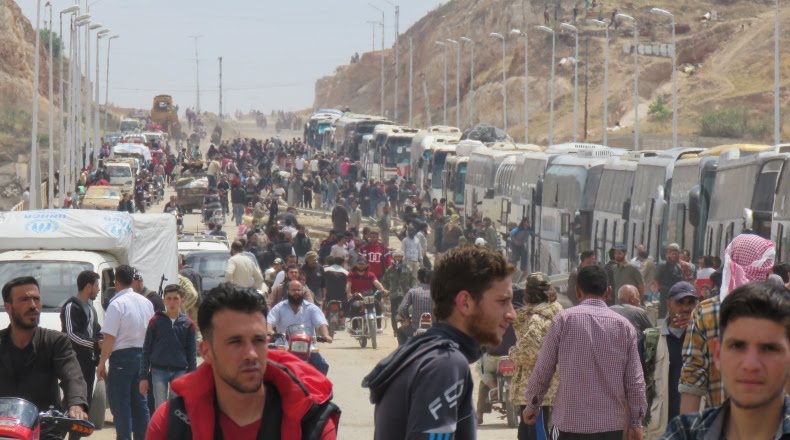Five years have passed since the Syrian regime forces and Russia imposed forced displacement on the people of the Houla region in the northern countryside of Homs, as part of a “reconciliation” agreement sponsored by Moscow that stipulated the exit of the people of the northern Homs and southern Hama countryside to Idlib.
The fifth anniversary of the displacement coincides with the normalization of relations with Assad by some Arab countries, and his return to the Arab League Council, more than 12 years after he was expelled due to his violations and crimes against the Syrians.
The displaced from the northern Homs countryside say that the fifth anniversary of their departure from their cities and towns, which coincided with the rehabilitation of Bashar al-Assad, will only increase their determination to move forward with their revolution and stick to their demands.
The Houla region is a plain inhabited by more than 100,000 Sunni Muslims, surrounded by a range of mountains inhabited by residents of the Alawite sect loyal to Bashar al-Assad.
On May 25, 2012, this region witnessed a horrific massacre, in which more than 106 civilians were killed, more than half of whom were children, who were slaughtered with knives.
Residents confirm that the perpetrators of this massacre are from the neighboring Alawite villages, as they stormed, under the cover of the Syrian regime’s artillery, one of the neighborhoods of Houla, and liquidated all those who were there.
Although the United Nations documented this massacre, and the international monitoring mission, which was active in Syria at the time, examined all the bodies of the victims and confirmed that Assad’s forces were the ones who committed the massacre, it did not take any step to redress the victims.
Ahmed Abdul Razzaq, a native of the Houla region and resides in a camp for the displaced near the Syrian-Turkish border north of Idlib, confirmed to “Global Justice Syria News” that he cannot in any way return to his town under the presence of the Assad regime. Abdul Razzaq told us that more than fifty of his family members died during the 2012 massacre, and those who remained were forcibly displaced to Idlib about six years later.
Abdul Razzaq confirms that returning to Assad’s rule again means suicide for him and all the people of his town, saying that the regime armed the people of the loyal villages and controlled them over the besieged plain, and unleashed their hands against the people of Houla.
He added, “How can someone who buried his sons and brothers return to the rule of the Syrian regime, and who will secure his life if he returns?”
For his part, the teacher, Hassan Bakkar, said that his family’s house in the Houla region was seized by the regime forces and turned into a security point, stressing that it is impossible for any of his relatives to dare to return to the area and ask about their house.
Bakkar added in his interview with “Global Justice Syria News”: “I no longer own anything in Houla, our house was controlled by the regime forces and became a security point, and our land is adjacent to the loyal villages and it is difficult for us to approach them, in addition to that my brother and I are wanted by the security branches on charges of participating in demonstrations.” .
Our speaker criticized the Arab countries for normalizing relations with the regime, and submitting to it under the threat of drugs, calling on the international community to do justice to the Syrians and not waste their sacrifices by rehabilitating those who killed, displaced and abandoned them.
Regarding the situation in the Houla region during the current period, Bakkar said that the region lacks the basic necessities of life, as there is no electricity or communications, in addition to the high prices, the scarcity of materials, and the lack of job opportunities, in addition to the continuous raids and arrest campaigns by the regime forces.
It is worth noting that Russia imposed forced displacement on the residents of the region after launching a massive military campaign against it after blockading it and cutting off food and medicine for a period of nearly five years.



















